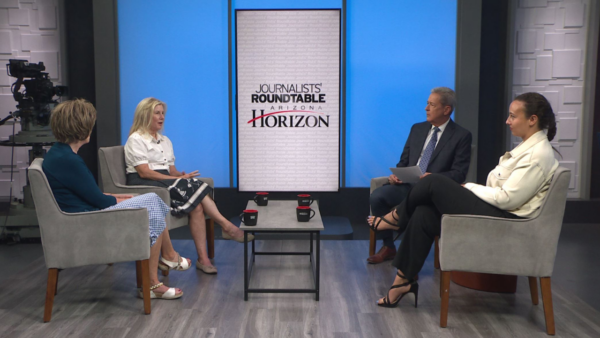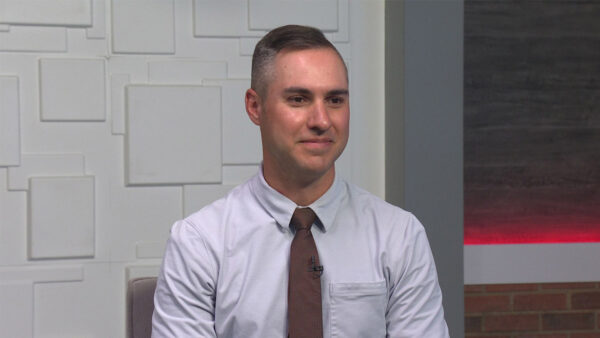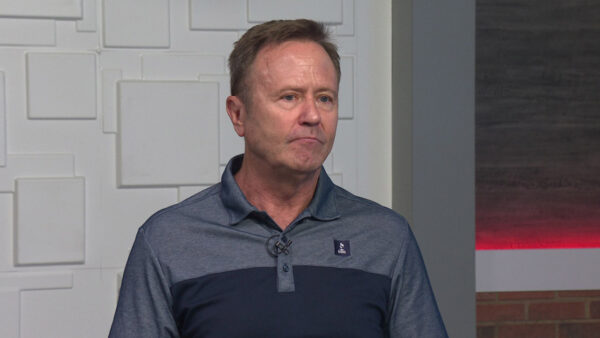A federal judge in Texas has issued a ruling against President Obama’s executive order to grant deferred deportation to certain groups of illegal immigrants. Arizona State University law professor Paul Bender will discuss the legalities of the case.
Ted Simons: Coming up next on "Arizona Horizon," we'll take a closer look at the injunction blocking President Obama's executive action on deferred deportation. And Arizona's Senate-president and Speaker of the House discuss the latest from the state capitol. Those stories next on "Arizona Horizon."
Video: "Arizona Horizon" is made possible by contributions from the friends of eight. Members of your Arizona PBS station. Thank you.
Ted Simons: Good evening and welcome to "Arizona Horizon." I'm Ted Simons. A federal judge in Texas rules that President Obama overstepped his authority in granting deferred deportation status to certain groups of undocumented immigrants. The president plans to appeal the ruling. Here now to discuss the legalities of the case is ASU law professor Paul bender. Good to see you again.
Paul Bender: Nice to see you today.
Ted Simons: What did this U.S. district court judge rule on Monday?
Paul Bender: It's complicated and not what you might think. It is just a preliminary injunction. Not a permanent thing. He does not rule on the constitutionality on the president's action. Which is the thing Congress is so upset about. He rules on the basis of the administrative procedure act to say that the order it is really not the president's order, but a memo by the end of homeland security to people who work for him that that should have been preceded by a notice and comment period of I think 30 days before it issued, because it was rule-making or an order covered by the administrative procedure. That is all he says. Really not overstepping his authority. It is not going through the proper procedures.
Ted Simons: I think the quote is legislative substantial rule without requiring with procedural requirements and talk public notices common period.
Paul Bender: As far as that decision is concerned maybe the government is thinking about doing that, put it out to notice and comment and when the period closes they could do it again and they have complied with this order. Underlying questions much bigger and important.
Ted Simons: We will get to those in a second. Does executive action need those procedures?
Paul Bender: It depends on it is very complicated. Administrative procedure, is not easy to understand. Lines between different things are not clear but I think that the general rule is if it is a discretionary action, if it is something that the executive has discretion to do or not to do, it is not covered by the administrative procedure act. That's the issue here. President said and the head of homeland security in setting up this program said that I'm exercising prosecutorial discretion, and I'm doing it on a case-by-case basis. If you accept that, then probably the administrative procedure act does not apply because when a prosecutor decides not to prosecute somebody for something he doesn't have to put that notice in comment before especially if it is an individualized decision. And the memo that the head of homeland security sent to his employees said that you should, in each case, you have discretion to decide whether deferred action is appropriate. So, if that's true, then it is individualized discretionary decisions and the APA would not apply.
Ted Simons: Is that the difference between an executive action in this case as opposed to an executive order? Would the order have needed those procedurals?
Paul Bender: I don't think there is any magic in action or order. This is neither actually. It is a memo that the head of homeland security sent to people at homeland security, saying, hey, we have a big problem here. We have 14 million people who are here probably illegally. We cannot deport all of them as one. I am going to exercise ask you to exercise my discretion by taking these people who we feel are the lowest priority to deport. There are two classes of people. One are the dreamers who- he expanded the program a little bit. And the other are parents who are undocumented but who are the parents of children who are American citizens. Mostly because they were born here. Or who are people who, although not citizens, have a right to be here. And those people he said are the lowest priority. And, so, we are going to put them aside for three years when we have higher priorities of people to deport. And I want you to exercise that discretion, but do it on an individualized basis in each case. The question is that the kind of order that the APA applies to? And I think there is a strong argument that it is not.
Ted Simons: Judge also said, comment on this please, department of homeland security is quote creating laws from scratch.
Paul Bender: That is basically the issue. Department of homeland security, first of all, is not allowed to create laws from scratch, but if it did, it would have to put them out for notice and comment first. Department of homeland security says we are not creating laws, we are just exercising our discretion about who to go after first given the fact that we have many, many more people that we could deport than we could possibly deport. We don't have the resources to do that. Marshalling the resources and leaving alone the people that we find the least of a problem, the people who two programs, one is the dreamers act. Kids brought here illegally by their parents but educated here and lived here for a long time. Other are parents with children who were born here, and that unless those people have committed crimes or some other problem, they're the lowest priority to deport.
Ted Simons: Judge said that that kind of reasoning's, is in his words a complete abdication of immigration enforcement.
Paul Bender: That's what he says. The question is whether he is right. You can't deport everybody. You have to have some order of priorities, and what the government is trying to do is say what we are doing is staging our order of priorities. They could follow this order of priorities without the president announcing a new program and nobody would say anything about it. It's the announcement that we're going to formalize this thing, but what's wrong with formalizing your priorities and telling your employees, hey, these are our priorities? That's the underlying issue is whether the president is making law which he cannot do, or simply exercising his discretion about whom to deport and who not to.
Ted Simons: Is there something else about Texas would have to would suffer somehow because they would have to issue drivers license to those who qualify, familiar refrain here in Arizona.
Paul Bender: That goes yeah, and it was the subject of a 9th circuit case here. That goes to a preliminary issue that is very important, whether the plaintiffs in this case have any standing to raise these issues. The plaintiffs in this case are 26 states, and they what is their standing? They are not being deported. They say their standing is that if the president's order is followed, then they will have extra expenses because these people will not be deported and they will be here, and the president's order lets them have a work permits while they're here and they say so we're going to have to give them drivers licenses. Texas says it costs $200 to give a driver's license and the fee is only $25. That costs us $175 for each person and we have how many thousands of people who that will cost us a lot of money. That is the basis on which the judge found they had standing. That is a shaky basis because they don't have to give drivers licenses to these people.
Ted Simons: With that in mind lets see what happens in the future. I would imagine an emergency stay
Paul Bender: I don't know whether I would have expected they would have done that already, they being the Federal Government. As far as I know, they did not do that today. They I would think they would go to the 5th circuit and ask them to stay the injunction.
Ted Simons: Right.
Paul Bender: And if the 5th circuit didn't do that, they would go to the supreme court and ask them to stay the injunction. If they won't stay the injunction, they would probably ask to have an appeal done as soon as possible. These programs one was just getting started. The dreamers expansion of the dreamers program was supposed I think today or tomorrow. The other program was supposed to start in three months. I think the government would like to get the legal issues settled before the three month period is up.
Ted Simons: Appeal for the could be any time but could take several weeks. You have the GOP standing, the republican standing, or the state that
Paul Bender: The state.
Ted Simons: The state. Whether or not they have standing this could take months, couldn't it?
Paul Bender: Sure, if you do that on the merits, right. The issue now is given the fact that there is questionable standing and given the fact that it is questionable whether what the president is doing is really an order that has to comply with the APA, whether it is discretionary action rather than making law, what is the right thing to do? Should you stop the program from starting or should you keep the status quo the way it is? The judge made a good point about that. Hey, if we let these people start registering for this program and being told they can stay and six months from now we say you can't, that's very destructive. We ought to get the legal issues decided before we tell people they can stay here for three years.
Ted Simons: Maybe the administration starts to hold public hearings.
Paul Bender: Maybe so. I have been surprised at the administration's willingness to say okay, we will obey this situation. The chief justice of Alabama, he had to tell his people to start granting marriage licenses. Who is the federal judge to tell us what to do? Here you have a single federal judge in Texas who is telling the whole country what to do. That's a remarkable thing. And the government is accepting that now and deciding what to do.
Ted Simons: We will see what happens next. Always a pleasure. Good to see you.
Paul Bender: Same here.
Paul Bender:Law Professor, Arizona State University;























